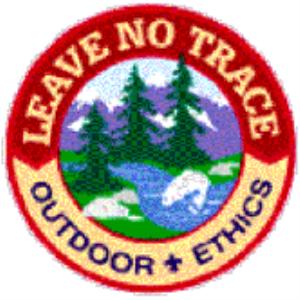|
|
|
|
|
|
|
|
|
|
|
|
|
 |
 |
 |
 |
|
 |
 |

|
Leave No Trace (R) is a "new" idea--for most folks. Scouts have had an unofficial motto for years: "Leave a site better than you found it."
The National Park Service has had this saying for a long time too: "Take nothing but pictures; leave nothing but footprints."
LNT is really more of a philosophy and a lifestyle than a series of rules & regulations. Here are the seven principles set on the LNT website.
The following copyrighted language has been reprinted with permission from the Leave No Trace Center for Outdoor Ethics: www.LNT.org.
Plan Ahead and Prepare
- Know the regulations and special concerns for the area you'll visit.
- Prepare for extreme weather, hazards, and emergencies.
- Schedule your trip to avoid times of high use.
- Visit in small groups when possible. Consider splitting larger groups into smaller groups.
- Repackage food to minimize waste.
- Use a map and compass to eliminate the use of marking paint, rock cairns or flagging.
Travel and Camp on Durable Surfaces
- Durable surfaces include established trails and campsites, rock, gravel, dry grasses or snow.
- Protect riparian areas by camping at least 200 feet from lakes and streams.
- Good campsites are found, not made. Altering a site is not necessary.
In popular areas:
- Concentrate use on existing trails and campsites.
- Walk single file in the middle of the trail, even when wet or muddy.
- Keep campsites small. Focus activity in areas where vegetation is absent.
- In pristine areas:
- Disperse use to prevent the creation of campsites and trails.
- Avoid places where impacts are just beginning.
Dispose of Waste Properly
- Pack it in, pack it out. Inspect your campsite and rest areas for
trash or spilled foods. Pack out all trash, leftover food, and litter.
- Deposit solid human waste in catholes dug 6 to 8 inches deep at
least 200 feet from water, camp, and trails. Cover and disguise the
cathole when finished.
- Pack out toilet paper and hygiene products.
- To wash yourself or your dishes, carry water 200 feet away from
streams or lakes and use small amounts of biodegradable soap. Scatter
strained dishwater.
Leave What You Find
- Preserve the past: examine, but do not touch, cultural or historic structures and artifacts.
- Leave rocks, plants and other natural objects as you find them.
- Avoid introducing or transporting non-native species.
- Do not build structures, furniture, or dig trenches.
Minimize Campfire Impacts
- Campfires can cause lasting impacts to the backcountry. Use a
lightweight stove for cooking and enjoy a candle lantern for light.
- Where fires are permitted, use established fire rings, fire pans, or mound fires.
- Keep fires small. Only use sticks from the ground that can be broken by hand.
- Burn all wood and coals to ash, put out campfires completely, then scatter cool ashes.
Respect Wildlife
- Observe wildlife from a distance. Do not follow or approach them.
- Never feed animals. Feeding wildlife damages their health, alters
natural behaviors, and exposes them to predators and other dangers.
- Protect wildlife and your food by storing rations and trash securely.
- Control pets at all times, or leave them at home.
- Avoid wildlife during sensitive times: mating, nesting, raising young, or winter.
Be Considerate of Other Visitors
- Respect other visitors and protect the quality of their experience.
- Be courteous. Yield to other users on the trail.
- Step to the downhill side of the trail when encountering pack stock.
- Take breaks and camp away from trails and other visitors.
- Let nature's sounds prevail. Avoid loud voices and noises
Back to top
Section last updated/reviewed 11 May 10.
Please note that the images and logos here, as on all our pages, are
© (copyright) their respective owners and used by gracious permission. See our Special Thanks! page for details and links.
|
|
 |
 |
|
 |
 |
 |
 |
|
|
|
|
|
|
|
|
|